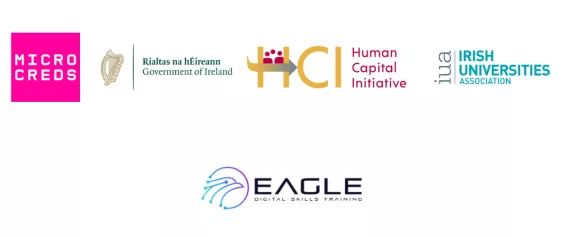
Course Details
Contact(s):
Express Interest
Register your interest here for more information or to be notified when applications are open.
Brief Description
The aim of this module is to introduce the learner to standard business systems to collect and interpret datasets for data-driven intelligence. Therefore, learners will develop an understanding of the need to design and develop database systems, collect, clean, visualise and interpret data rooted in best data analysis practice. This module adopts an applied learning approach to identify opportunities and work with data through the lens of the relational database model.
FUNDING
- 100% Funding through Project EAGLE
A limited number of fully-funded places are available through Project EAGLE, a collaboration between the University of Limerick, the European Project EAGLE, and Skillnet. Priority will be given to SMEs and start-ups.
APPLICATION INFORMATION
Please ensure you enter the Module Code above when applying for this MicroCred. Applications without this cannot be processed. You may apply for more than one MicroCred under the same application.
Course commencement is subject to minimum numbers.
PATHWAY
This micro-credential represents a single module within a larger further award (e.g., Certificate, Diploma, Masters). By taking this micro-credential you may be eligible to apply for a credit exemption should you progress to study for a further award.
The programme(s) associated with this MicroCred are:

This module adopts an applied learning approach to identify opportunities and work with data through the lens of the relational database model.
The aim of this module is to introduce the learner to standard business systems to collect and interpret datasets for data-driven intelligence. Therefore, learners will develop an understanding of the need to design and develop database systems, collect, clean, visualise and interpret data rooted in best data analysis practice.
The module is broken down to provide an overview of the following areas:
- Introduce the use of database technologies and data visualisation in a relevant industrial context.
- Represent pattern, trends, and correlations through appropriate data visualisation techniques, relevant to the learners of Business and Industrial practice.
- Analyse the application of computational intelligence to decision making problems in a relevant Business and Industrial context.
- Build on the Digitalization of Process module understand the need to generate suitable datasets to extract valuable information.
- Use appropriate software to perform time series analysis and forecasting.
- Investigate approaches to machine learning and select and develop appropriate algorithms for a specific data stream.
- Understand the need for data analytics applications for decision support on an empirical data stream relevant to the learners Business and Industrial practice.
On successful completion of the module students will be able to:
- Summarise the main elements Data Analytics/Visualisation & Machine Learning.
- Differentiate predictive from descriptive analytics in terms of methods and output.
- Analyse the application of computational intelligence to decision making problems in a relevant Business and Industrial context.
- Analyse the results of machine learning algorithms.
- Recognise the role of data visualisation in the process evaluation.
- Demonstrate an awareness of the benefits of data Analysis for industry and society.
Applicants should have a first or second-class Level 8 honours degree, or equivalent prior learning that is recognised by the University as meeting this requirement.
Entry requirements are established to ensure the learner can engage with the course material and assessments, at a level suitable to their needs, and the academic requirements of the module. By applying to this micro-credential, you are confirming that you have reviewed and understand any such requirements, and that you meet the eligibility criteria for admission.
Successful completion of this module does not automatically qualify you for entry into a further award. All programme applicants must meet the entry requirements listed if applying for a further award.
€1,250
Graduate and Professional Studies
+353 (0)61 234377
University of Limerick, Limerick, Ireland
Contact Us | Download Prospectus | Sign up to stay informed | Quality and Feedback